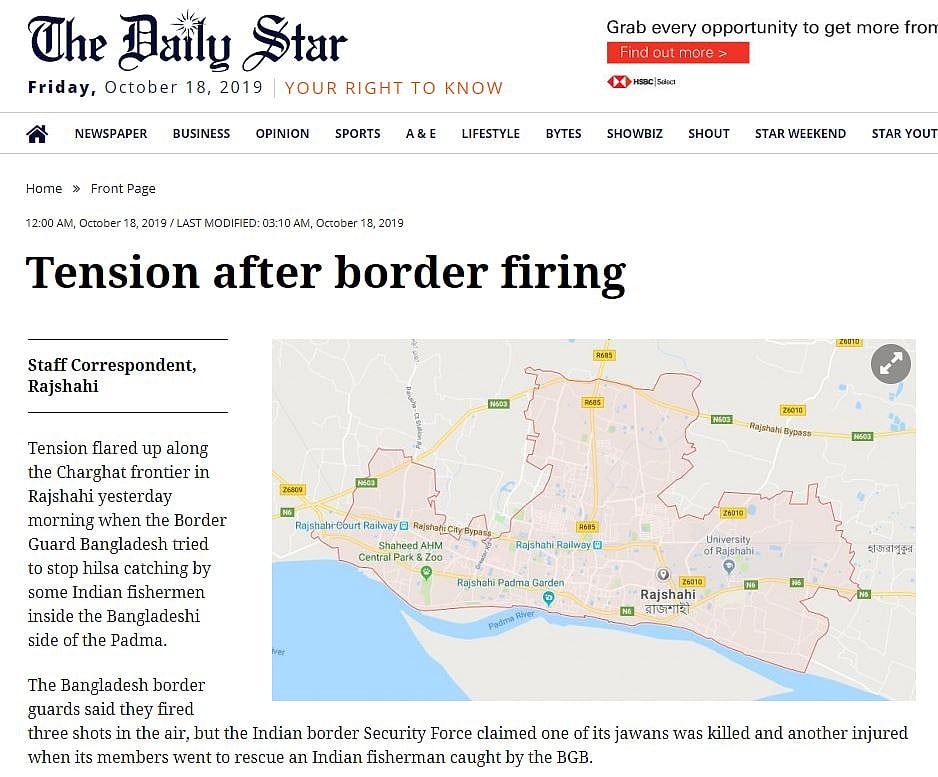Bangladesh claims Indian fishermen defied the ban on catching Hilsa fish and BSF men intruded
The lure of the Hilsa, a prized fish, triggered the exchange of fire between Border Guard Bangladesh (BGB) and India’s Border security Force, in which a BSF Vijay Bhan Singh got killed


The exchange of fire in which a BSF Head Constable was killed on Thursday on the Indo-Bangladesh border was over Indian fishermen fishing for the exotic Hilsa. Bangladesh’s paramilitary- Border Guard Bangladesh (BGB) claims to have opened fire in self defence in which a Border Security Force head constable Vijay Bhan Singh was killed and another BSF jawan injured.
One of the three Indian fishermen allegedly involved in fishing the banned Hilsha fish in Bangladesh river Padma is in the custody of the BGB, maintained reports available in Dhaka.
Bangladesh government has imposed a 22-day ban from the full moon day this month on catching, selling and transporting Hilsa in a 7000 km breeding ground to ensure safe spawning of the prized and tasty fish during its peak breeding period. But the Indian fishermen are accused of having defied the ban and entered Bangladesh waters for fishing.
Bangladesh's government during the peak breeding period of the Hilsa fish, conducts a massive operation to prevent the fishermen from Bangladesh to catch Hilsa and also prevent Indian fishermen who enter the territorial waters of Bangladesh for the prize catch which fetches high prices in India.
On Thursday morning, a speed boat carrying three fishermen from India entered the Bangladesh water along Charighat in the Rajshahi district with fishing nets. The three fishermen from India were apprehended by the BGB. The BGB security personnel later sent two fishermen to the Indian territory to tell the BSF personnel to come for a flag meeting while the BGB kept one of the fishermen. After the fishermen reached the BSF post and informed them about the arrest of one of the Indian fishermen by the BGB, the four BSF personnel armed with weapons went into Bangladesh, ostensibly for the flag meeting.
“ The BSF men entered 650 yards inside Bangladesh territory and opened fire. Only one of the BSF men was in uniform and the other three were not in uniform and were in civilian clothes wearing shorts. The BGB guards stopped the BSF men and told them that that the captive fisherman would be handed over to the BSF after a flag meeting. But the BSF men tried to forcibly take him away. “
“The BGB guards told the BSF that even they have entered the Bangladesh water and even they would be held and would be handed over to the authorities only after a flag meeting as it was a violation of the border. The thee BSF men then tried to go back into Indian territory taking with them the two fishermen; and when BGB men tried to obstruct their return, they opened fired on the BGB and in the exchange of fire one of the BSF men got killed and another injured” said Lt Col Ferdous Mehmood in Dhaka.
It was the first such incident in which a BSF jawan was killed. Normally the two security forces never ever open fire and whenever there was a dispute the two countries officials would amicably solve the dispute by holding a flag meeting.
The Bangladesh fisheries department tries to stop the fishing during this 22-day period which started from October 9 this year. During the time, each fisherman’s family will receive 30kg of rice from the government, under its vulnerable group feeding (VGF) program.
In order to ensure the safe reproduction of Hilsha, the fisheries department has been imposing bans, since 2003, on catching Hilsha during the Bangla month of Ashwin to Kartik. The ban is imposed under the Protection and Conservation of Fish Act 1950.
Any breach of the ban will result in one to two years of imprisonment and a maximum fine of Tk5,000.
The fisheries department, navy, air force, coast guard, police, river police, Rapid Action Battalion (RAB), Border Guard Bangladesh (BGB), district and Upazila administrations, including the Fisheries and Livestock Ministry, will enforce the ban.
Hilsha production in Bangladesh has gone up by 159.76% in the last 15 years, thanks to the government's efforts, including their ban on catching brood fish, and fries.
Production of Hilsha stood at 517,000 tons in 2017-18, up from 199,000 tons in 2002-03.
Total production is expected to surpass 550,000 tons within five years.
Follow us on: Facebook, Twitter, Google News, Instagram
Join our official telegram channel (@nationalherald) and stay updated with the latest headlines
Published: 18 Oct 2019, 12:18 PM
